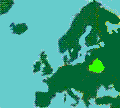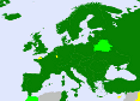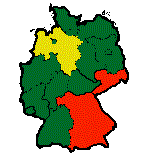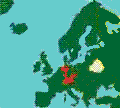and mail this URL to your friends!
|
and mail this URL to your friends! |
 Freedom
of Information or access to information (ATI) - also known as the
public's right to know or administrative transparency - gives
citizens access to official information hold by government and other
public authorities. In 1766 a Freedom
of Information Law (Tryckfrihetsförordningen) was introduced in
Sweden-Finland,
thanks to a Finn
named Anders
Chydenius,
who (inspired
of 7th century China) fought for democracy, equality, and respect
for the human rights. 1888 followed Columbia, 1919
in constitution and 1951 law in Finland (independent
1917) and 1966 in USA.
Freedom
of Information or access to information (ATI) - also known as the
public's right to know or administrative transparency - gives
citizens access to official information hold by government and other
public authorities. In 1766 a Freedom
of Information Law (Tryckfrihetsförordningen) was introduced in
Sweden-Finland,
thanks to a Finn
named Anders
Chydenius,
who (inspired
of 7th century China) fought for democracy, equality, and respect
for the human rights. 1888 followed Columbia, 1919
in constitution and 1951 law in Finland (independent
1917) and 1966 in USA.
Since then more than 100 countries
adopted such laws. Many countries guarantee FOI
in constitutions. More thens 125
states with more then 5.9 billion
inhabitants adopted FOI laws or provisions in constitutions. ATI is
now firmly recognised as an internationally guaranteed human right,
with decisions at the Inter-American Court of Human Rights and
European Court of Human Rights, and global recognition by the UN
Human Rights Committee. All countries in
Europe have FOI laws or are preparing
bills. Nearly all OECD
countries and all developed countries
recognize Freedom of information. Right2Info.org
gives an overview.
RTI-Rating.org
rates laws according to international standards. Transparency
was the Word of the Year 2003 and 28.
September 2003 was the first "Right
to Know" Day.
11.December 2021: How does the Norwegian government manage to deal with around 300,000 requests for access to files per year?
19. February 2020: Case Against Germany: No Right to Information Law in Bavaria Breaches Right to Freedom of Expression
29. June 2019: The Centre for Law and Democracy sends a detailed complaint to Human Rights Committee c/o OHCHR-UNOG, Petition Team, referanse
03. June 2017: Request for access to Norway's reply: ‘Discontinue forced treatment/hospitalization’
March 2016: Complaint to the European Court of Human Rights, Access to Information in Bavaria
February 2016: Draft Complaint to UN about rejection access to public document to enforce access to information in Bavaria/Germany
09. April 2014: Constitutional Complaint 1 BvR 897/14: Enforcement of the Human Right of Access to Information in Bavaria/Germany.
26. May 2013: The Call for Innovative and Open Government: How to increase transparency for citizens/customers?
14. May 2013: Baltic Sea NGO Forum and Unesco supported ATI in Germany: What's next?
25. April 2013: The Human Rights Council supported 6 of 8 suggestions of the Baltic Sea NGO Forum
2. April 2013: Does anyone else have positive experiences with the UN Universal Periodic Review (UPR)?
31. March 2013: Will CoE Support the Human Right of Access to Public Documents?
5. January 2013: National Report in Preparation for the 2nd Hearing of Germany under the Universal Periodic Review
7. November 2012: Will OSCE Support the Human Right of Access to Public Documents?
4. November 2012: Should GRECO and HRC experts do the job they are paid for?
18. September 2012: Universal Periodic Review (UPR) Germany: Access to Information is missing in 5 states in Germany
14. September 2012: Parallel Report to the UN Human Rights Committee: Access to Information
30. August 2012: 5 German states fail to respect human right of access to information, found for 84% of the worlds population
24. August 2012: GRECO failed in Second Evaluation Round and must therefore do better in Third Round
14. July 2012: Is it Possible to Enforce the Human Right of Access to Information in Bavaria/Germany?
17. May 2012: Will the Parliamentary Assembly of the Council of Europe support transparency in Germany
22. April 2012: The role of international lawmakers and their respective influence on national legislation on access to information (pdf)
25. February 2012: Rejection of Suggestions of Commissioner for Human Rights by German Parliaments, Freedom of Information and Separation of Powers
15. February 2012: Will political parties strengthen transparency and anti-corruption?
26. January 2012: What has to be done to improve transparency and fight against corruption in Germany?
5. September 2011: The project ‘Electronic Public Records’ (OEP) won the European Public Sector Award 2011.
1 . September 2011: Can OSCE and CoE promote access to information for Germany
16. June 2011: Freedom of information missing in 6th German ICCPR state report.
11. February 2011: Germany asked to remove the human right of access to public documents and other human rights.
21 December 2010: UN Special Rapporteur and OAS Statement on Wikileaks
01. August 2010: Norway: Ca. 1200 requests per 100 000 inhabitants, i.e. twice as much as in USA (A6 list).
18. May 2010: Norwegian Government: Every citizen now able to look public authorities in the cards (Ministry of Government Administration, Reform and Church Affairs)
18. February 2010: "Icelandic Modern Media Initiative" with "ultra-modern" Freedom of Information Act.
28. January 2010: My advice to Prime Minister Stoltenberg of Norway.
14. April 2009: ECHR Application no. 37374/05 by TÁSZ against Hungary recognizes access to public documents as human right.
06. February 2008: Germany should Sign and Ratify the Council of Europe Convention on the Access to Official Documents.
02. December 2008: Norwegian Foreign Ministry answers.
17. November 2008: Application to Norwegian Foreign Minister to access documents on Convention on Access to Official Documents
Summer
2008: When will the last 5
German states adopt FOI laws?
![]()
6. October 2008: European Parliamentarians Call on Council of Europe to Redraft Substandard Convention on Access to Official Documents
11. August 2008: Letter to Chairman of CoE ministers about Convention on Access to Official Documents.
01. May 2008: Consumer Information Act in force in federation and most states.
10. December 2007: "Recognise My Right" Campaign to support the work of the Council of Europe
15. October 2007: Council of Europe Treaty on Access to Documents. Civil Society Calls for Urgent Action: Draft Convention Fails to Ensure Adequate Protection of Right to Information.
28. August 2007: Council of Europe Treaty on Access to Documents: Civil Society Calls for Urgent Action -- Draft Convention Fails to Ensure Adequate Protection of Right to Information
28. June
2007: ECHR application no.
31583/07 on publication
of income and sideline job of MPs.
![]()
24. April 2007: China finally approaches freedom of information jurisdiction – Decree on release of government information passed. Snell/Xiao: FOI returns to China.
01. March 2007: Fundamental Rights Agency: Access to Information and other Violations of Human Rights in Germany (E-mail). Answer
21. November 2006: What will the Commissioner for Human Rights report on visiting Germany?
16.
October 2006: Justice Initiative Intervenes in ECHR Strasbourg
Freedom of Information Case: Application
no. 11721/04. GERAGUYN KHORHURD PATGAMAVORAKAN AKUMB v. ARMENIA.
![]()
08.
August 2006: Realization of Freedom of Information failed in 8
German Federal States.
![]()
01. Aug. 2006: Will the International Helsinki Federation for Human Rights (IHF) promote human rights in Germany? Answer.
05.June 2006: FOI in Germany: Six Months After Implementation: Last slide: Federal government does not favour binding convention
01. June 2006: Will the EU Network of independent experts on fundamental rights promote human rights in Germany? Funding stopped.
16. May 2006: How much uranium is in mineral water?
3. April 2006: Access Info Europe suggests to give a binding convention for access to information.
01. Jan. 2006: Will the Parliamentary Assembly of Council of Europe promote Freedom of information? Petition transmitted to competent committee.
10. Dec. 2005: Petition EU Parliament: Suggestion to start consultations with German parliaments.
14. Nov. 2005: Human Rights for Citizens and Patients and Securing Freedom of Information in Constitution.
11. Nov.
2005: Complaint to ECHR. 8
March 2006: The Court will deal with the case as soon as possible.
![]()
19. Oct. 2005: Complaint to UN Petition team.
07. Sep. 2005: Petition to add access to public information to constitution.
18. Aug. 2005: Will Constitutional Court take International Law and Human Rights into account?
30. July 2005: When will FOI be realized in local states?
08. July 2005: Bundesrat approves FOI law. The Federal Data Protection Commissioner will become also Commissioner for Freedom of Information.
03. June 2005: Parliament Bundestag approved FOI law. Will Senate (Bundesrat) correct this?
01. June 2005: Hillbilly CSU Zeitlmann says FOI law is harmful and unnecessary.
30. June 2005: Defending violations of privacy more important for press then Freedom of information?
11. May 2005: Parliamentary Reading of FOIA cancelled.
14. Mar. 2005: Hearing: German Parliament about a FOI draft law.
15. Dec. 2004: Germany's ruling coalition gets serious about freedom of information.
13. Dec.
2004: Complaint to OSCE
(Organization for Security and Co-operation in Europe). Answer.![]()
28. Sep. 2004: Who supports Access to Information for Germany?
06. Nov.
2004: In my opinion Germany must be
sentenced: Info to EU Commission.
![]()
19. Oct. 2004: It is possible to force access to documents by court case? Question of access is not even admissible.
28. Sep. 2004: What can one expect from international organisations e.g. UN, EU, CoE, OSCE?
02. Mar. 2004:German NGOs publish their own FOI draft law.
27. Feb. 2004: EU directive on FOI for Germany? Liberation from Nazi law on Legal Advice? False report to UN?
06. Feb.
2004: Will the
administrative court promote Freedom of Information? Cost
of case € 770.- for 15 copies![]()
21. Dec.
2003: Petition on Human Rights
Violations in Germany: Invitation of the Human Rights
Commissioner. Survey. ![]()
13. Dec.
2003: 68th Anniversary of Nazi
Law on Legal Advice.
![]()
18. Nov.
2003: Info to Commissioner for
Human Rights of the Council of Europe. Answer.
![]()
22. Oct. 2003: Germany violates Human rights, but makes false reports.
23. June 2003: Swedish solution for Freedom of Information in Germany?
24. Feb. 2003: Will chancellor Schröder promote Freedom of Information?
17. Jan. 2003: Why failed Freedom of Information in Germany?
23. June
2002: Result: I was enthusiastic
one year ago, because Germany had the chance to catch up with
the international development. Who is
responsible for that this chance was wasted?![]()
29. May 02: Would a web site www.article19.de help?
22. May 02: EU COM (2002) 247: Communication from the Commission - A project for the European Union: 1.2 The Union must build up an EU-wide area of freedom, security and justice. Europe-Now.org
08.05.02: Will chancellor candidate Stoiber promote Freedom of Information?
06.05.02: Constitutional Complaint: Freedom of Information for Germany. No right to a fair answer.
27.04.02: Letter to EU Convention. Answer.
26.04.02: New Corruption Measure Not Expected to Cause Much Pain. By Eva Busse. FAZ
24.04.02: Land Baden-Württemberg votes against freedom of information.
18.04.02:
Letter to the President of the EU Commission.
Answer of the Commission. Courrier
du Citoyen. EU did not stress me ![]()
18.04.02: Complaint to Centre for Human Rights of the United Nations (copy to Bundestag (German parliament) and Landtag)
16.02.02: Letter to EU Council: Councils answer to Communication (93) 191. My confirmation of receipt.
February 2002: Lamble, Stephen. (2002) “Freedom of Information, a Finnish clergyman’s gift to democracy”, Freedom of Information Review, No. 97, February 2002, pp. 2-8.
06.01.02: Letter to Council of Europe
02.01.02: To attract additional interest to freedom of information (described in my German page) this page was created to try to gain support of the European institutions and the European public.
27.12.01: Petition to the European Parliament. Addition 7. July 2002. Admission and conclusion: Improving the protection of the rights and interests of citizens of the Member States of the Union is listed in Article 2 as an objective of the Union. (see page 7/173 doc. A5-0318/2000).
20.12.01: Petition to German Parliament
23.06.01: The German ministry of internal affairs invited citizens to participate in an Internet Discussions. I welcome the plans of a freedom of information law for Germany, a chance to catch up with the international development.
![]() Albania,
Argentina,
Armenia,
Azerbaijan,
Australia,
Austria, Belarus,
Belgium,
Belize,
Bosnia and
Herzegovina, Brazil,
Bulgaria,
Canada,
Colombia,
Council
of Europe, The
Czech Republic, Denmark, Eritrea,
Estonia,
European
Union, Finland, Fiji,
France,
Georgia,
Germany, Greece,
Hong
Kong, Hungary,
Iceland, India,
Ireland, Israel,
Italy,
Jamaica,
Japan,
Kazakhstan,
Kyrgyzstan,
Latvia,
Lithuania,
Luxembourg, Macedonia
(FYROM), Mexico,
Moldova, Mongolia,
Nigeria, The
Netherlands, New
Zealand, Norway, Pakistan,
Panama,
Peru,
The
Philippines, Poland,
Portugal,
Romania,
Russia,
Slovak
Republic, Slovenia,
South
Africa, South
Korea, Spain,
Sweden, Switzerland,
Tajikistan,
Thailand,
Trinidad
und Tobago, Turkmenistan,
Uganda,
Ukraine,
United Kingdom, United
States of America, Uzbekistan.
Albania,
Argentina,
Armenia,
Azerbaijan,
Australia,
Austria, Belarus,
Belgium,
Belize,
Bosnia and
Herzegovina, Brazil,
Bulgaria,
Canada,
Colombia,
Council
of Europe, The
Czech Republic, Denmark, Eritrea,
Estonia,
European
Union, Finland, Fiji,
France,
Georgia,
Germany, Greece,
Hong
Kong, Hungary,
Iceland, India,
Ireland, Israel,
Italy,
Jamaica,
Japan,
Kazakhstan,
Kyrgyzstan,
Latvia,
Lithuania,
Luxembourg, Macedonia
(FYROM), Mexico,
Moldova, Mongolia,
Nigeria, The
Netherlands, New
Zealand, Norway, Pakistan,
Panama,
Peru,
The
Philippines, Poland,
Portugal,
Romania,
Russia,
Slovak
Republic, Slovenia,
South
Africa, South
Korea, Spain,
Sweden, Switzerland,
Tajikistan,
Thailand,
Trinidad
und Tobago, Turkmenistan,
Uganda,
Ukraine,
United Kingdom, United
States of America, Uzbekistan.
 The
global
trends on the right to information are investigated by ARTICLE
19, the Global Campaign for Free Expression. Considering both
laws and constitutions FOI
is widely recognized as human right. Right2Info.org
gives an overview. FOI is based on
The
global
trends on the right to information are investigated by ARTICLE
19, the Global Campaign for Free Expression. Considering both
laws and constitutions FOI
is widely recognized as human right. Right2Info.org
gives an overview. FOI is based on
Article 19 of the Universal Declaration of Human Rights given by UN.
The International Covenant on Civil and Political Rights includes FOI in Article 19.
Article 13 of the American Convention on Human Rights includes the right to seek information. The Inter-American Court of Human Rights Confirms Right of Access to Government Information 19. September 2006 in case Marcel Claude REYES et al. v. Chile Case No. 12.108:.
Article 9 of the African [Banjul] Charter on Human and Peoples' Rights includes freedom of information. The Organization of African Unity is working on a Convention on Combating Corruption.
The Commonwealth promotes FOI since 1980. The Commonwealth Human Rights Initiative campaigns the Right to Information.
Article 10 of the European Convention on Human Rights includes Freedom of opinon and Freedom of Information. In 1981 the Council of Europe gave "Recommendation No. R (81) 19" on the access to information held by public authorities. A new Recommendation Rec(2002)2 was adopted 2002. 10. July 2006 the ECHR decides in case Sdruženi Jihoceské Matky v. Czech Republic, Application no. 19101/03 that Access to information is admissible. 11. April 2006 the ECHR decides in case GERAGUYN KHORHURD PATGAMAVORAKAN AKUMB v. ARMENIA Application no. 11721/04 to communicate the freedom to reveive information to Armenia.
The EU Charter of Fundamental Rights gives a right of access to European Parliament, Council and Commission documents.
![]() right2info.org
gives an overview on constitutional protection of the right to
information: In Sweden - with longest tradition - FOI is found in
the Constitution
(Chapter
2, Article 1 (2)). The constitutions of
many other countries i. e. Albania
(Art.
23), Belarus
(Art. 34), Belgium
(Art. 32), Bulgaria
(Art. 41), Croatia
(only for journalists: Art. 38), Czech
Republic (Charter of Fundamental Rights and Freedoms: Art. 17),
Estonia
(Art. 44), Finland (Constitution,
Section
12), Georgia (Art. 41), Hungary
(Art.
61), Lithuania
(Art. 25), Macedonia
(Art. 16), Moldavia
(Art. 34), Netherlands
(Art. 110), Poland
(Art. 61), Portugal
(Art. 268), Rumania
(Art. 31), Russian
Federation (Art. 29), Slovenia
(Art. 39), Slovakia
(Art. 26), Spain
(Art. 105 b), Argentina
(Art. 43), Kazakhstan,
Kyrgyzstan,
Malawi
(Art. 37), Mongolia
(Art. 16, 17), Mozambique
(Art. 74), Nepal
(Art. 16), Panama (Art. 42,43,44),
the Philippines
(Art. III, Sec. 7), Peru
(Art. 200(3)), the Republic
of South Africa (sec. 16), Tanzania
(Art. 18(2)), Tajikistan,
Thailand
(Sec. 58), and Turkmenistan
(26) all guarantee the right to access information held by the
State.
right2info.org
gives an overview on constitutional protection of the right to
information: In Sweden - with longest tradition - FOI is found in
the Constitution
(Chapter
2, Article 1 (2)). The constitutions of
many other countries i. e. Albania
(Art.
23), Belarus
(Art. 34), Belgium
(Art. 32), Bulgaria
(Art. 41), Croatia
(only for journalists: Art. 38), Czech
Republic (Charter of Fundamental Rights and Freedoms: Art. 17),
Estonia
(Art. 44), Finland (Constitution,
Section
12), Georgia (Art. 41), Hungary
(Art.
61), Lithuania
(Art. 25), Macedonia
(Art. 16), Moldavia
(Art. 34), Netherlands
(Art. 110), Poland
(Art. 61), Portugal
(Art. 268), Rumania
(Art. 31), Russian
Federation (Art. 29), Slovenia
(Art. 39), Slovakia
(Art. 26), Spain
(Art. 105 b), Argentina
(Art. 43), Kazakhstan,
Kyrgyzstan,
Malawi
(Art. 37), Mongolia
(Art. 16, 17), Mozambique
(Art. 74), Nepal
(Art. 16), Panama (Art. 42,43,44),
the Philippines
(Art. III, Sec. 7), Peru
(Art. 200(3)), the Republic
of South Africa (sec. 16), Tanzania
(Art. 18(2)), Tajikistan,
Thailand
(Sec. 58), and Turkmenistan
(26) all guarantee the right to access information held by the
State.
 The
EU
Charter of Fundamental Rights gives a right of
access to European
Parliament, Council
and Commission
documents.
The
EU
Charter of Fundamental Rights gives a right of
access to European
Parliament, Council
and Commission
documents.
FOI laws came first to Scandinavia (Sweden
(1766), Finland, Norway,
Denmark
and Island),
then to English speaking countries (USA
(1966), Ireland,
England (UK))
and at last to German speaking countries (Austria
(1986), Switzerland und
Germany).
FOI laws in other European countries are collected here. Germany still lacks Freedom of Information in 5 of 16 states as nearly the only major country in Europe.
 |
|
 Freedom
of Information came 1766
to Sweden, 1951
to Finland, 1966
to den USA, 1970 to Norway
and 1985
to Denmark In 1981 the Council of Europe gave "Recommendation
No. R (81) 19" on the access to information held by public
authorities. A new Recommendation
Rec(2002)2 was adopted 2002. Both EU and nearly all countries in
the EU and Europe adopted such laws. However citizen rights vary and
there are no minimum standards. In order to keep up with the
international development freedom of information should be
strengthened in EU member states. Here is a petition
to the European Parliament.
Freedom
of Information came 1766
to Sweden, 1951
to Finland, 1966
to den USA, 1970 to Norway
and 1985
to Denmark In 1981 the Council of Europe gave "Recommendation
No. R (81) 19" on the access to information held by public
authorities. A new Recommendation
Rec(2002)2 was adopted 2002. Both EU and nearly all countries in
the EU and Europe adopted such laws. However citizen rights vary and
there are no minimum standards. In order to keep up with the
international development freedom of information should be
strengthened in EU member states. Here is a petition
to the European Parliament.
Support Freedom of Information, by
the following call of Statewatch (click here):
I/We
support the call to EU institutions for a democratic and accountable
"Open Europe" on access to documents.
Freedom of Information came 1951
to Finland, 1766
(1949) to Sweden, 1966
to den USA, 1970 to Norway
and 1985
to Denmark. In 1981 the Council of Europe gave "Recommendation
No. R (81) 19" on the access to information held by public
authorities. Germany is the only country in the EU without such a
law. In order to keep up with the international development freedom
of information should also be adopted in Germany.
Support
the German Freedom of Information Law, by
the following E-Mail to the German Government (click here):
I
support the call to the German Government for a democratic and
accountable Freedom of Information Law on access to public
documents.
(You may change the text
according to your needs).

 The
Federal Republic of Germany is the only country in the EU without
FOI. But 11 of 16 federal federal states (Bundesländer)
Brandenburg,
Berlin,
Schleswig-Holstein,
North
Rhine-Westphalia, Bremen,
Mecklenburg-Western
Pomerania, Saarland, Hamburg,
Thuringia
and Rheinland-Pfalz
have adopted FOI. Opposition parties in the states of Bavaria,
Hesse, Lower
Saxony, Saxony, Saxony-Anhalt
have suggested FOI laws. Unfortunately parliaments in
Baden-Württemberg, Bavaria, Hesse and Saxony have voted against FOI
laws.
The
Federal Republic of Germany is the only country in the EU without
FOI. But 11 of 16 federal federal states (Bundesländer)
Brandenburg,
Berlin,
Schleswig-Holstein,
North
Rhine-Westphalia, Bremen,
Mecklenburg-Western
Pomerania, Saarland, Hamburg,
Thuringia
and Rheinland-Pfalz
have adopted FOI. Opposition parties in the states of Bavaria,
Hesse, Lower
Saxony, Saxony, Saxony-Anhalt
have suggested FOI laws. Unfortunately parliaments in
Baden-Württemberg, Bavaria, Hesse and Saxony have voted against FOI
laws.
Support the Freedom of Information laws in the states of:
Baden-Württemberg,
Bavaria,
Hesse,
Lower
Saxony, Saxony,
Saxony-Anhalt
with the following E-Mail:
I
support
the call to the German Federal State (Bundesland) Government for a
democratic and accountable Freedom of Information Law on access to
public documents.
(This E-Mails is send
to the parties governing the state, with a copy to the opposition
suggesting the FOI law. You may change the text according to your
needs).
Warning: I do not accept any liability that the information on these pages is correct, accurate or up to date!
Please feel free to link this site!
Thanks to all, who gave me this information. Please do not hesitate to mail me if you have additional information.
Visitor
No.
since
2. January 2002
[Petitions] [Violations of Human Rights] [Patients Rights in Europe] [Critique of Patients Rights in Germany] [Back to Homepage]